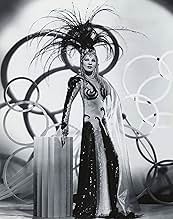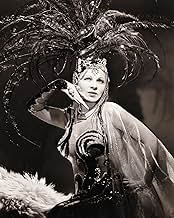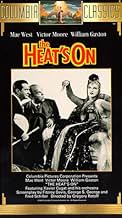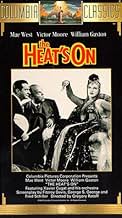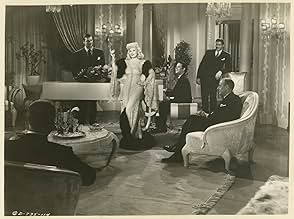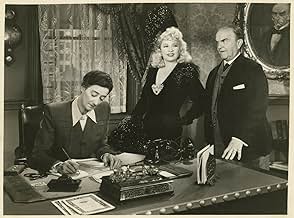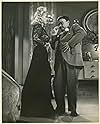When his biggest star joins a rival's show, a Broadway producer bluffs and schemes to get her back.When his biggest star joins a rival's show, a Broadway producer bluffs and schemes to get her back.When his biggest star joins a rival's show, a Broadway producer bluffs and schemes to get her back.
Leon Belasco
- Shore - the Agent
- (uncredited)
Beatrice Blinn
- Babette
- (uncredited)
Featured reviews
Broadway star Fay Lawrence (Mae West) wants out of her contract with producer Tony Ferris (William Gaxton). She can do it if the show does badly. A society foundation shuts them down and she jumps to rival Forrest Stanton. Tony is willing to do anything to get her back including using the same foundation and its hapless vice president Hubert Bainbridge (Victor Moore) who wants to help his niece's performing ambitions.
This is Mae West's last theatrical release before making a semi-return some three decades later. She delivers her style of comedy with less sexuality. There is some music. The songs may be appealing to some. For most of this, the lead character is actually Ferris. He's not that compelling or appealing with all his scheming. If this was written by Mae West, she would probably be the lead from the start. She does take over in the last act and that's a good section. If only the movie has more of those.
This is Mae West's last theatrical release before making a semi-return some three decades later. She delivers her style of comedy with less sexuality. There is some music. The songs may be appealing to some. For most of this, the lead character is actually Ferris. He's not that compelling or appealing with all his scheming. If this was written by Mae West, she would probably be the lead from the start. She does take over in the last act and that's a good section. If only the movie has more of those.
Turner Classic Movies just unearthed this turkey from their vaults and, being a fan of Mae West (though not an avid one), I thought I'd give it a whirl. Big mistake! (i.e., Big disaster!) After it had unspooled, TCM's host, Robert Osborne, revealed that producer-director Gregory Ratoff had somehow obtained Mae's signature on a contract to appear in this film without her seeing a completed script. When she did get an astonished look at what she was supposed to headline, she was "furious" according to Osborne, and promptly went to work rewriting most of her scenes, adding a few (but not enough) of her trademark witticisms.
The story is more than silly and takes little advantage of Miss West's star power, and, except for Hazel Scott's interpolated production numbers, there's almost no one else in the cast to match Mae's wattage. But she looks great, slinking around in Walter Plunkett's fancifully fantastic creations and Franz Planer's glossy black-and-white cinematography makes the most of the second-tier production values typical of a Columbia Pictures programmer.
Poor Victor Moore is required to portray a pathetic boob, intimidated by a battleaxe of a sister, quite effectively embodied by one Almira Sessions. The ingénue, played by Mary Roche, probably didn't elicit many wolf whistles when this dud was shown to the troops during WW II; Lloyd Bridges has a really small role as her swain (in uniform, of course); and there's an actor named Lester Allen, playing a character appropriately called Mouse Beller, who could only be cast in a role with that moniker.
Mae West quit performing before the cameras (going back to the stage and touring with her fabled nightclub act) and didn't make another picture until "Myra Breckenridge" in 1970 (and she was arguably the best thing in that crazy curiosity). This one is only for those fans who want to get a look at what Hollywood thought it could get away with during the wartime years.
The story is more than silly and takes little advantage of Miss West's star power, and, except for Hazel Scott's interpolated production numbers, there's almost no one else in the cast to match Mae's wattage. But she looks great, slinking around in Walter Plunkett's fancifully fantastic creations and Franz Planer's glossy black-and-white cinematography makes the most of the second-tier production values typical of a Columbia Pictures programmer.
Poor Victor Moore is required to portray a pathetic boob, intimidated by a battleaxe of a sister, quite effectively embodied by one Almira Sessions. The ingénue, played by Mary Roche, probably didn't elicit many wolf whistles when this dud was shown to the troops during WW II; Lloyd Bridges has a really small role as her swain (in uniform, of course); and there's an actor named Lester Allen, playing a character appropriately called Mouse Beller, who could only be cast in a role with that moniker.
Mae West quit performing before the cameras (going back to the stage and touring with her fabled nightclub act) and didn't make another picture until "Myra Breckenridge" in 1970 (and she was arguably the best thing in that crazy curiosity). This one is only for those fans who want to get a look at what Hollywood thought it could get away with during the wartime years.
At 49, Mae West appeared in this bagatelle produced and directed by her friend, Gregory Ratoff, who needed a name actor to justify the production, but the main character is a hapless bumpkin, well played by Victor Young. Nearly three decades passed before she appeared in another movie. Even more odd was the brief career, as an actress, of pretty, charming Mary Roche, who played Young's niece, although she went on to work as a hair stylist on eight features, three of them very important ones, beginning with "On the Waterfront" (1954). This story of an attempt to put on a Broadway show goes in one ear and out the other, except for Xavier Cugat and his orchestra and the amazing piano playing of Hazel Scott, who even plays two pianos at once.
I'm a big fan of Mae West, and I waited for years to see this insignificant, forgettable little movie. Although I knew it had gotten bad reviews at the time of its release--- and West herself didn't like it any more than the critics did--- I thought there still might be something in it worth seeing, since it holds such an important place in her career: this was the final movie of her 1930s/1940s "movie star" period. After it was done, West returned to live stage work, recording sessions, and of course her famous nightclub act of the 1950s. She was not to make another film for 27 years (at which time she did the rather infamous "Myra Breckinredge" in 1970).
Seeing "The Heat's On" is an exercise in tedium. I had to literally struggle to stay awake during it. It's not that it's all that horrendously "bad"--- heck, even bad movies can be entertaining for the wrong reasons. This one is just....empty. Completely vapid and forgettable. It's easy to understand why Mae West practically disowned this movie.
The main thing wrong with it is that she isn't in it nearly enough. For the entire first hour, I swear that West had about 6 minutes of total screen time, scattered throughout in a series of VERY short "blink and you'll miss it" scenes. She's got more charisma and screen presence, by far, than anybody else in this thing--- when she's on, you can't take your eyes off her. But you hardly get to see her! Giving West more screen time would have improved this movie immensely, and it's a mystery to me why director Gregory Ratoff didn't understand that.
What makes her absence from the screen even more frustrating, if not downright puzzling, is that so much of this movie is a revue/type *musical* (in neon lights), the type of film that could have shown her at her absolute best. But instead you get one lame song after the other filling the screen; there are singers, dancers, production numbers, showgirls, Latin-flavored guitarists, even a boogie-woogie pianist/singer (blues and jazz great Hazel Scott, playing herself). They all come in, do their thing, leave, and it's on to the next song. With the singular exception of Scott, who is wonderful--- all of this is absolutely and completely forgettable. Most of the singers, the dancers, the songs, the movie itself: it's "B"-grade material at best. We aren't talking MGM-quality here, folks.
Watching this parade of musical mediocrities go by, all you can think of the entire time is "Where IS Mae West??! Why don't they bring her on?" But it never happens until the very end, at which time you'll be practically asleep if you've managed to sit through it all up to that point. It's hard to imagine who might be a fan of this picture.
For what it's worth, West does look pretty good. Always proud of her youthful appearance, she was 50 years old here, but she looks maybe 40-ish, and she's dressed in stylish, contemporary clothes for one of the very few times in her screen career. (Well, except for her very first musical number, in which--- amusingly--- she's in her trademark "gay 90s" garb, looking much like she did in her earlier films).
The story--- what flimsy plot there is of it--- has something to do with Broadway musical star Fay Lawrence (West) getting funding for her next show, and having producers fight over her. But the main point of this movie, and the most amount of screen time, is devoted to the endlessly boring musical numbers. Gentle, befuddled Victor Moore is the primary male lead; and a YOUNG Lloyd Bridges--- yes, he was young once!--- has a featured part as a soldier engaged to Moore's niece.
Not a bad movie, just a boring one, and it missed the boat all around. Mae West deserved better.
Seeing "The Heat's On" is an exercise in tedium. I had to literally struggle to stay awake during it. It's not that it's all that horrendously "bad"--- heck, even bad movies can be entertaining for the wrong reasons. This one is just....empty. Completely vapid and forgettable. It's easy to understand why Mae West practically disowned this movie.
The main thing wrong with it is that she isn't in it nearly enough. For the entire first hour, I swear that West had about 6 minutes of total screen time, scattered throughout in a series of VERY short "blink and you'll miss it" scenes. She's got more charisma and screen presence, by far, than anybody else in this thing--- when she's on, you can't take your eyes off her. But you hardly get to see her! Giving West more screen time would have improved this movie immensely, and it's a mystery to me why director Gregory Ratoff didn't understand that.
What makes her absence from the screen even more frustrating, if not downright puzzling, is that so much of this movie is a revue/type *musical* (in neon lights), the type of film that could have shown her at her absolute best. But instead you get one lame song after the other filling the screen; there are singers, dancers, production numbers, showgirls, Latin-flavored guitarists, even a boogie-woogie pianist/singer (blues and jazz great Hazel Scott, playing herself). They all come in, do their thing, leave, and it's on to the next song. With the singular exception of Scott, who is wonderful--- all of this is absolutely and completely forgettable. Most of the singers, the dancers, the songs, the movie itself: it's "B"-grade material at best. We aren't talking MGM-quality here, folks.
Watching this parade of musical mediocrities go by, all you can think of the entire time is "Where IS Mae West??! Why don't they bring her on?" But it never happens until the very end, at which time you'll be practically asleep if you've managed to sit through it all up to that point. It's hard to imagine who might be a fan of this picture.
For what it's worth, West does look pretty good. Always proud of her youthful appearance, she was 50 years old here, but she looks maybe 40-ish, and she's dressed in stylish, contemporary clothes for one of the very few times in her screen career. (Well, except for her very first musical number, in which--- amusingly--- she's in her trademark "gay 90s" garb, looking much like she did in her earlier films).
The story--- what flimsy plot there is of it--- has something to do with Broadway musical star Fay Lawrence (West) getting funding for her next show, and having producers fight over her. But the main point of this movie, and the most amount of screen time, is devoted to the endlessly boring musical numbers. Gentle, befuddled Victor Moore is the primary male lead; and a YOUNG Lloyd Bridges--- yes, he was young once!--- has a featured part as a soldier engaged to Moore's niece.
Not a bad movie, just a boring one, and it missed the boat all around. Mae West deserved better.
5tavm
Well, after 40 years of reading about this movie, my curiosity has finally been settled! Her last movie before this one-My Little Chickadee-having been released three years previous, Mae West makes one more picture before taking a 27-year sabbatical from Hollywood. However, because she didn't write her material like before, she doesn't have much witty lines and in fact, has small screen time despite her above-the-title billing which she shared with William Gaxton and Victor Moore, both of whom have more scenes. It's with Moore that Ms. West has her one good scene with as she manages to get him drunk while he reveals the crux of the plot. Otherwise, this film is just an excuse to provide musical numbers of either Mae, Xavier Cugat and his Orchestra, or the excellent singing and piano skills of Hazel Scott and excellent Ms. Scott really is! If anyone makes this picture worth seeing, she does! P.S. Lloyd Bridges has a small role as a soldier who visits his girlfriend played by Mary Roche who's only appearance on film this was.
Did you know
- TriviaThis was Mae West's final film until Myra Breckinridge (1970) 27 years later.
- GoofsOn a wall of a producer's office is a presumably old publicity shot of Fay wearing an elaborate headdress that she doesn't actually wear until she performs a musical number later in film for an entirely new production staged by rival producer.
- Quotes
Fay Lawrence: [singing] If you want things put in order, Come and see me south of the border...
- SoundtracksI'm Just a Stranger in Town
(1943)
Music by Jay Gorney
Lyrics by Henry Myers and Edward Eliscu
Copyright 1944 by Mills Music Inc.
Performed by Mae West (uncredited) in the show "Indiscretions"
Details
- Release date
- Country of origin
- Languages
- Also known as
- Sinfonías dislocadas
- Production company
- See more company credits at IMDbPro
- Runtime
- 1h 19m(79 min)
- Color
- Aspect ratio
- 1.37 : 1
Contribute to this page
Suggest an edit or add missing content

